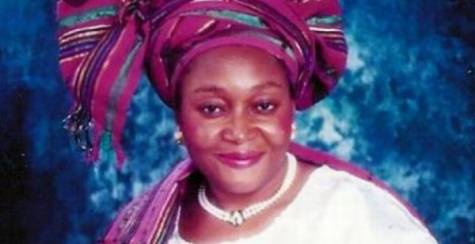Many Nigerians dedicated their lives to the actualisation of the mandate given to the late Chief M.K.O Abiola during the June 12, 1993 presidential election by the electorate. The election was subsequently annulled by the military despot, Ibrahim Babangida. In this piece, GBENGA ADENIJI writes about some of the women who lost their husbands to the struggle against tyranny
- Doyin Abiola: There is no way the history of the June 12, 1993 presidential election will be written without a reference to the late Chief Moshood Kashimawo Olawale Abiola, popularly called M.K.O Abiola, who won the election.
He lost one of his wives, Alhaja Kudirat Abiola, to the struggle for the realisation of his mandate, which was denied by the military regime of Ibrahim Babangida. Described by many as the heroine of democracy, Kudirat was murdered in Lagos on June 4, 1996, by evil agents for her doggedness in ensuring that her husband’s mandate did not go unrealised.
M.K.O Abiola had before then lost his first wife, Alhaja Simbiat Abiola, to sickness.
Though the late M.K.O Abiola had many wives, Dr. Doyin Abiola, readily comes to mind as one of his widows. She was the first female editor of the now rested national newspaper, National Concord, and rose to become the Managing Director/Editor-in-Chief of Concord Press Limited, publishers of the Concord newspapers; one of the business concerns of the deceased philanthropist.
Doyin deployed her professional and managerial skills to turn around the fortunes of the newspaper even in the face of military threats. She is a classy and well-respected journalist. She firmly participated in the struggle for the validation of her husband’s mandate. The bravery of the septuagenarian in standing solid until the end of the struggle against the military received commendation from many progressives. Doyin is continually celebrated as a woman of substance and has earned respect and admiration in the public space.
M.K.O Abiola sacrificed so much for the validation of the mandate which he was freely given by the majority of the electorate on that day. Gen. Sani Abacha, who smuggled in another cruel military regime, used his jackboots to intimidate him to forget the mandate. But he refused, maintaining a strong will not to betray the trust that Nigerians reposed in him. Sadly, M.K.O Abiola later died in detention on July 7, 1998 after Abacha’s death on June 8, 1998. His death sparked outrage across the country as many Nigerians believed that he was murdered.
Some children of M.K.O Abiola have also been orphaned by the June 12 struggle. Some of them are Kola, Hafsat and others. They have, however, weathered the storm and moved on to achieving greater things.
Hafsat, in a tribute to her late mother, Kudirat, on the twentieth anniversary of her death on June 4, this year, noted, ‘‘Today, let us remember that when Chief Abiola was in detention when many pro-democracy leaders had fled the country to continue the battle against military dictatorship, Kudirat Abiola and others kept the flag flying at home. She led the marches. She sold her properties to support her husband’s household and to finance the movement.’’
Ganiat Fawehinmi: She is the first wife of the late legal icon, Gani Fawehinmi. She is a doting woman who gave immense support to her husband’s life of activism and put everything in order at home during the time he was incarcerated in prisons across the country.
The widow of the exceptional legal luminary has continued to remain strong and focused in the face of daunting challenges. Ganiat continually speaks truth to power and displays matchless qualities as were exhibited by her indefatigable husband before his death.
Fawehinmi died on September 5, 2009 of lung cancer. He lived for the poor and the oppressed. He took up the battles of many, and the rich who were denied justice also enjoyed his fairness. Fawehinmi pursued a good deal for the Nigerian people and a country devoid of graft, tyranny, bad governance and ethnic divisions.
Because of his unbending stance, he was detained many times in detention camps across the country. He also fought several battles against oppression till he died. He also contested the Presidency in 2003 on the platform of the National Conscience Party, which he formed in 1994. His contributions to the June 12 struggle were immeasurable.
Fawehinmi means different things to many people. Those who tirelessly stand on the wrong side of history tag him a pain in the neck. But those who preach the gospel of justice and equity consistently describe him as a unique breed.
Martha Bagauda-Kaltho: She is the widow of the fearless journalist and the then Kaduna correspondent of The News magazine, James Bagauda-Kaltho, believed to have been killed by the military during the June 12 struggle. She has been able to keep alive the memory of her late husband by focusing on the future and taking life in her stride. Despite the challenges posed by single motherhood, Martha has refused to be distracted. She is truly one of the strong widows of June 12 heroes.
Her husband was reportedly kidnapped by the forces of darkness in 1996 for his in depth and analytical stories that exposed their secrets. But to cover up their evil deeds, which remain bare till date, the haters of democracy went to town with a warped story that he died in the course of detonating a bomb. Of course, no sane person believed the contorted theory. Even in death, Bagauda-Kaltho remains an outstanding hero. Apart from living in the hearts of many true Nigerians, the naming of the Lagos State Secretariat’s Press Centre after him was one of the many ways his comrades immortalised him.
Alao Aka-Bashorun’s wives: Mrs. Kudirat Atinuke Aka-Bashorun (nee Fujah) and Mrs. Gisselle Modinat Aka-Bashorun are the widows of the late human rights lawyer and ex-President of the Nigerian Bar Association, Alao Aka-Bashorun.
Both women stood solidly behind their husband during his many activities against military dictatorship. They took care of the home front in the dark days of military rule. Kudirat, whose father was the Ajiroba of Lagos, became a councillor in Surulere Local Government Area of Lagos State. She was a businesswoman and lives in Lagos. The second wife, Gisselle, who is from Gabon, was a caterer and operated a restaurant in the then Central Bank of Nigeria’s headquarters in Lagos, at one time. She currently lives in Cotonou.
Though the activities of the late human rights lawyer, Alao Aka-Bashorun, were outstandingly against military rule, they undoubtedly contributed in shaping the agitation against the annulment of the June 12, 1993 presidential election.
The military regime of the despot, Ibrahim Babangida, also seized his passport in 1990 because of his unending opposition to military rule. He was true to his vision for the Nigerian dream and pursued lofty ideals for the NBA to be a fortress for the oppressed and the weak until he died on October 1, 2005.
One of his children, Abimbola, said of her late father, ‘‘He wanted the military to go. He said they were not governing the country well.’’
Ochuwa Ubani: She is the widow of the civil rights activist, Chima Ubani, who died on September 21, 2005 in a ghastly motor accident on his way from Maiduguri, where he and some activists had gone to hold a rally to protest against fuel price hike.
The deceased left behind four children that his widow has been struggling to cater for. The first daughter is Adoha, aged 16; and the second daughter is Eyeoma, 13. There are also twins; Ekene and Okoro, (male) who were eight months old when their father died.
Ubani rallied many human rights groups during the struggle for the validation of the mandate given to Chief M.K.O Abiola. His protests against the annulment of the election were propagated through the vibrant roles of the Campaign for Democracy.
Security operatives were sent to raid his office and house for documents relating to his work schedules and human rights activities. But he was not cowed as he persistently raised his voice against the annulment and did not hide his disdain for military rule.
The military agents of the late Sani Abacha later arrested and imprisoned him. Rather than being discouraged by his ordeal, it further strengthened his resolve to condemn injustice, totalitarianism and go for the jugular of the wasters of the country’s resources. The global human rights group, Amnesty International, condemned his incarceration and sought his release. Ubani was later named Amnesty International’s Prisoner of Conscience.




